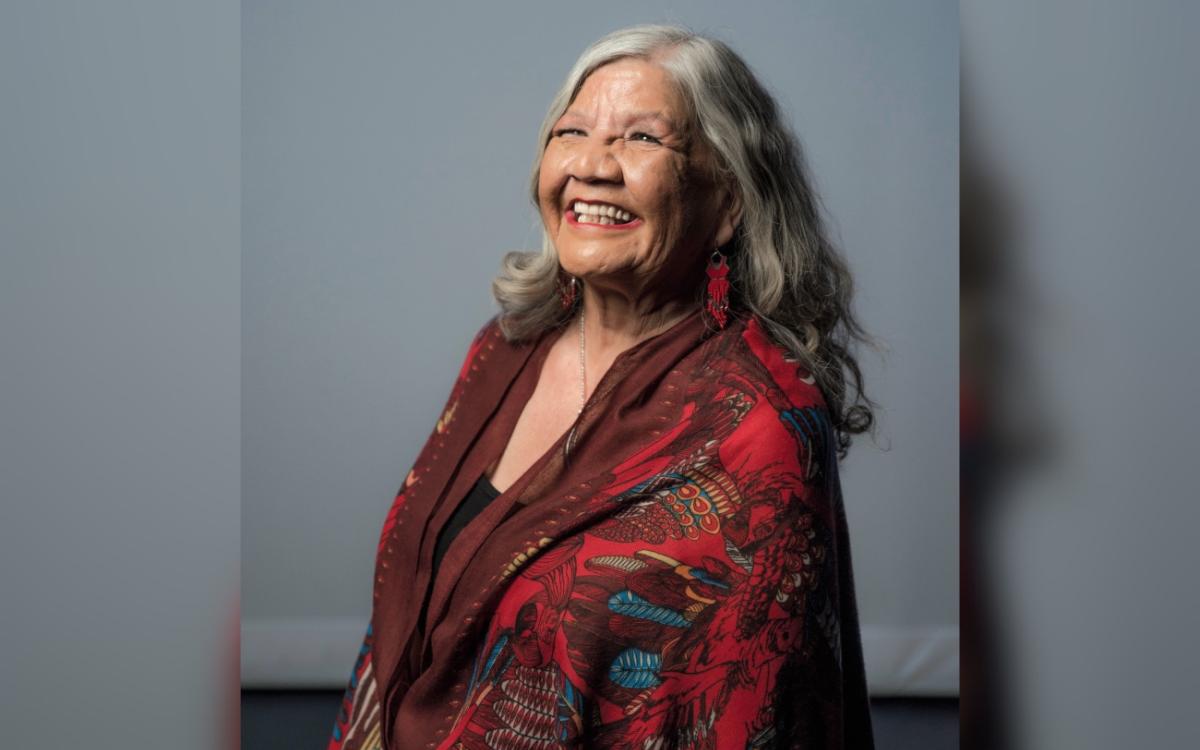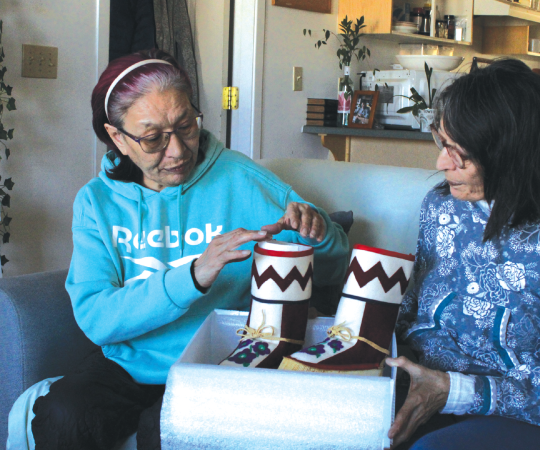The memory still gives Gail Cyr chills.
It was a sunny–and thankfully bugless–mid-June day in 2007. That morning, nearly one hundred Yellowknifers, clad in red shirts and toting protest signs, joined together to begin a march down the highway out of town. They intended to walk 116 kilometres from Yellowknife to the Tłı̨chǫ community of Behchokǫ̀, on the same stretch of road where, 17 years earlier, a 15-year-old Dene girl from Łútsël K'é had gone missing while hitchhiking.
Cyr was one of the forces behind the march that day. As an advisor to the NWT’s Minister Responsible for the Status of Women at the time, she had helped to organize the event to bring attention to the crisis of Missing and Murdered Indigenous Women and Girls in the territory. She looks back on everyone’s determination admiringly. “There was a real sense of camaraderie amongst the marchers,” Cyr says.
The group was only 10 kilometres away from Behchokǫ̀ when a caravan of cars approached.
“All of a sudden, the doors opened, and all of these people got out and joined us,” Cyr says. There were men, women, little kids atop their parents’ shoulders, all welcomed with smiles and hugs. “It was just a wonderful show of support from the community, and it made the march that much more special.”
The moment was a testament to how one action can snowball into something larger, and it’s one of many examples Cyr can point to from the decades she’s spent immersed in community issues. Since moving to Yellowknife from Manitoba in 1974, the 69-year-old has taken up cause after cause. She was even appointed to the Order of Canada last December for her dedication to making the North a better place—a passion fuelled by experiences from her younger years that still burns today.
When unpacking how she got here, Cyr always looks back to her childhood. She’s a survivor of the Sixties Scoop, born in Nelson House, Manitoba, apprehended from her Cree parents, and put into the foster care system as an infant. She never knew her family, community, or culture. “There were a lot of rough times, and there were a lot of lonely times,” she says.
Cyr says these feelings of loneliness as a child, as well as the racism and sexism she experienced when she moved to Winnipeg in 1970 for university, shaped who she is today. It’s where she got her deep sense of compassion and empathy for others. “You don't have to have identical experiences, but you can just see when people need help.”
When she came North in search of work, Cyr was drawn to projects that let her put that compassion into practice. One of her first and proudest achievements was founding the Native Courtworkers Association in 1975. The organization was formed to help Indigenous Northerners navigate a brand-new legal system being imposed on them.
“The NWT government just started up in 1966,” Cyr explains, “so the Legislative Assembly was passing lots of statutes.” Northerners were overwhelmed with all these changes, she says. With the new statutes being enforced, more and more people were getting charged.
“Everyone in the legal community basically said, ‘Okay, we need to create some kind of program here to help out.’”
Cyr admits she may have seemed an unlikely candidate for this task. She had no formal legal background, but she was well-read and saw a need within her community. She didn’t give it much thought before taking on the challenge.
The organization assisted with all sorts of cases: criminal trials, custody battles with child and family services, even helping people change government-issued anglicized names back to their Indigenous ones. The courtworkers—many of whom were Indigenous—would guide clients through these byzantine processes, in their own languages and at their own pace.
The program has changed significantly over the years and doesn’t have the same scope as it once did; nonetheless, Cyr says the decade she spent as executive director was incredibly rewarding. “If you won on behalf of your clients, you just watched that weight come off their shoulders. Sometimes they cried, they were so happy it worked out. It definitely makes you feel good.”
Cyr has been chasing that feeling for more than fifty years.
In every role she takes on, she’s become a voice for the voiceless: from sitting on Yellowknife’s city council, where she fought for more Indigenous representation in decision-making, to the work she did travelling to communities and helping them run their own elections, to her continued activism around family violence and Missing and Murdered Indigenous Women and Girls.
Cyr now likes to say she’s “semi-retired”—though in her case, emphasis is placed heavily on “semi.” She’s still a member of the NWT Human Rights Commission and is president of the Yellowknife Seniors’ Society. She has also been active in the local theatre scene, having acted directed, written, and staged a couple productions of her own.
And it doesn’t seem that Cyr is quitting in her quest to help her community any time soon. She still gets calls from people asking her for advice or to lend her natural leadership to one cause or another.
“People just kind of hear about you,” she laughs. “Oh, that’s Gail! But I don’t mind. It’s a lot of fun.”










